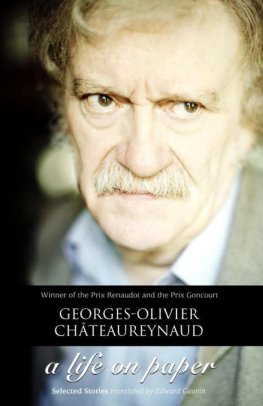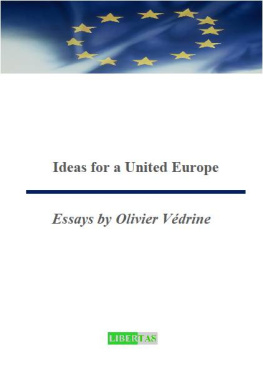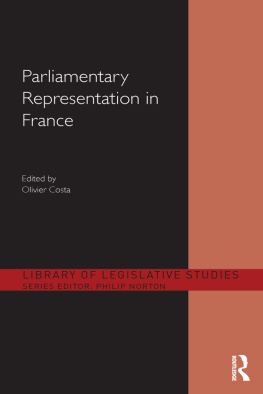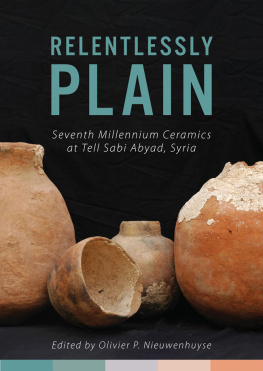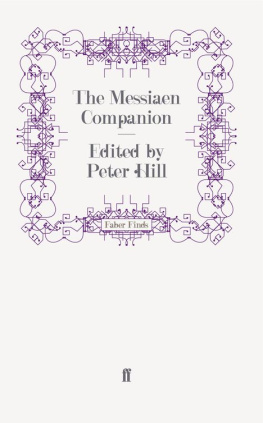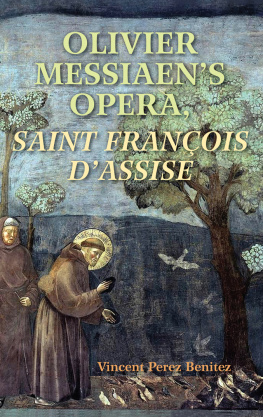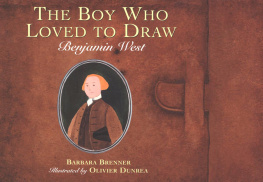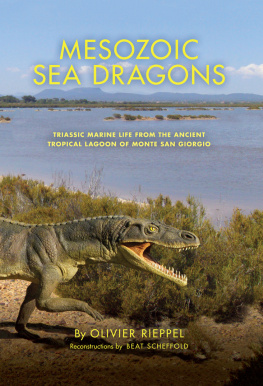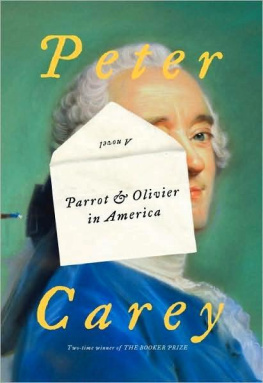THE REINVENTION OF RELIGIOUS MUSIC
THE REINVENTION OF RELIGIOUS MUSIC
Olivier Messiaens Breakthrough Toward the Beyond

Sander van Maas

Copyright 2009 Fordham University Press
All rights reserved. No part of this publication may be reproduced, stored in a retrieval system, or transmitted in any form or by any meanselectronic, mechanical, photocopy, recording, or any otherexcept for brief quotations in printed reviews, without the prior permission of the publisher.
Fordham University Press has no responsibility for the persistence or accuracy of URLs for external or third-party Internet websites referred to in this publication and does not guarantee that any content on such websites is, or will remain, accurate or appropriate.
Library of Congress Cataloging-in-Publication Data
Maas, Sander van, 1968
The reinvention of religious music : Olivier Messiaens breakthrough
toward the beyond / Sander van Maas.
p. cm.
Includes bibliographical references.
ISBN 978-0-8232-3057-0 (cloth : alk. paper)
1. Messiaen, Olivier, 19081992Criticism and interpretation.
2. MusicReligious aspects.Christianity. I. Title.
ML410.M595M34 2009
781.70092dc22
2008047148
Printed in the United States of America
11 10 09 5 4 3 2 1
First edition
To Jan Dijkstra,
Earwitness
Preface
At a time when culture has increasingly become the field of play where the opposing forces of secularization and religion meet, the question of the position of art is acquiring new meaning. Today, the secular status that art has held since the Enlightenment, and that was almost immediately contested by the adversaries of this revolution, has come increasingly under pressure. A development comes into view, not only in the visual arts but also and especially in music, that actualizes the question of the religious meaning of music or of listening to music. Since the fall of the Berlin Wall, the work of a number of composers with an explicit religious thematics has reached the West, and it seems that, within the canon of Western European and North American traditions, there is less diffidence in publicly touching upon religious and spiritual themes. Such developments once again make clear that involving religious perspectives in the practice of creating and (to a lesser extent) performing music has never fully disappeared; that even those moments in the history of twentieth-century music that were, ostentatiously, among the most antireligious or areligious were accompanied by a certain religious-spiritual discourse all the same.
Academic thought on the relation between music and religion, however, appears to be seriously anemic. Musicologywhether historical, formalist, or newseems to have lost the sense for studying music as a phenomenon with a certain penchant for religion. The social process of secularization and the diminished significance of religious practice and theology entailed by this have created circumstances in which publicly testifying to the possibility of a musica sacra has become increasingly less acceptable. Musicography (both inside and outside academia) has followed this dual trend, discarding religious music as the subject for critical and systematic study. As a phenomenon with a relation (frequently either underestimated or overestimated) to the religious, music forms no subject for debate, unless it be either in circles of all too credulous music lovers who, wholly in the spirit of the Enlightenment, are guided by their own individual opinions, or with those who, steering by the beacon of dogma, adhere to theological and practical orthodoxyeach group, in other words, having particular reasons for shunning a critical distance in broaching the subject. Such approaches have become outdated, because of both the return of the religious in the public intellectual debate and far-reaching transformations of orthodox forms of religion in the contemporary world.
This new momentum, which appeared to have found an ideal vehicle in the music and discourse of Olivier Messiaen, is precisely the impulse for writing this book. Many agree that, as a child of the twentieth century and thoroughly aware of contemporary developments in art, religion, and society, Messiaen paved the way for a new, open form of musical religiosity. The public has discovered his music by now, and many are attracted by it, searching in one way or another for more than just the notes and constructive principles that Messiaen so gladly elucidated. Without doubt, his music is bien harmonise, but at the same time there is something in listening to his music that requires an analysis not just in technical terms. As I discovered in the early stages of research, neither aesthetics nor theology dispose of the adequate means to this endand, in this respect, musicology or theory of music do not appear to be very fruitful, either. An attempt to counter the risks, in contemporary thought, of a facile rejection of the strange yet familiar talent of music to relate in one way or another to the religious, this book is most of all concerned with the question of offering a different perspective on a modern dilemma, by freshly exploring the possibilities for continuing to think through precisely the disconcerting dream that was fostered by the lore of ancient, nave, but possibly so wise philosophy of music: a music that escapes the constitutive coordinates of the aesthetic object.
Acknowledgments
This book would not have been written if I did not have the support of many people. Foremost, I wish to thank Hent de Vries, who over the years has inspired my writing and enriched my mind with his overwhelming erudition and grand-scale approach to matters philosophical and theological. I feel privileged that I could always rely on his warm support and encouragement for this wildly interdisciplinary project. My other supervisor, Rokus de Groot, deserves an equal share of my gratitude for his infinite patience and his preparedness to let me go into any direction I wanted. In our many sessions he showed me how the ear is the organ of curiosity and that, ultimately, to think well is to listen well. Of all the others who have contributed to this bookand there are many more than I can mention hereKiene Brillenburg Wurth should be mentioned as the true savior of the project. Although we have had more beautiful things to share since the birth of Titus, I cherish the days in Amsterdam and Paris when it seemed that every stone in the pavement hid a crucial insight for the argument of the manuscript. Her love for nineteenth-century theories of art opened my eyes for what was really at stake, and surely I am not alone in this respect. However, all this could have led to the present book only through the support of one incredible person, whose career spans the publication of many books cited in the pages that follow: Fordham University Press editor Helen Tartar. It was she who inspired and supported unwaveringly the translation and reworking of the original Dutch book. I thank Aleid Fokkema for translating the wide-ranging and sometimes technically difficult manuscript so skillfully, and the Dutch Organization for Scientific Research (NWO) for their financial support. I thank Andrew Shenton and the anonymous reviewer for their support for and critical comments on earlier versions of the manuscript and, last but not least, editors Gregory McNamee and Eric Newman for their diligent work in the final stages. Needless to say, all remaining flaws are mine.
Next page

